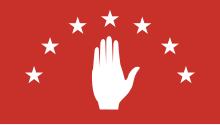Abazins
This article needs additional citations for verification. (July 2015) |
 Flag of the Abazins | |
| Total population | |
|---|---|
| 210,000 (est.) | |
| Regions with significant populations | |
| 15,000–150,000[1][2] | |
| 43,341 36,919 3,646 418[1] | |
| 5,000–15,000[3] | |
| 128[4] | |
| Languages | |
| Abaza, Russian, Arabic, Turkish | |
| Religion | |
| Predominantly Sunni Islam | |
| Related ethnic groups | |
| Abkhazians, Circassians | |

The Abazin, Abazinians or Abaza (Abaza and Abkhaz: Абаза; Circassian: Абазэхэр; Russian: Абазины; Turkish: Abazalar; Arabic: أباظة) are an ethnic group of the Northwest Caucasus, closely related to the Abkhaz and Circassian peoples. Now, they live mostly in Turkey, Syria, Jordan, Egypt and in Karachay-Cherkessia and Stavropol Krai in the North Caucasus region of Russia. The Tapanta (ru:Тапанта), a branch of the Abaza, lived between the Besleney and Kabardian princedoms on the upper Kuban.
Abaza people historically speak the Abaza language, a Northwest Caucasian language most closely related to Abkhaz, and more distantly related to the Ubykh and Circassian languages. There are two dialects of Abaza spoken in Karachay-Cherkessia: Ashkharua and Tapanta. The culture and traditions of the Abazin are similar to those of the Circassians. On many old maps Abazin territory is marked as part of Circassia (Adygea).
According to the 2010 Russian census, there were 43,341 Abazins in Russia.[1]
Diaspora
[edit]An Abazin diaspora exists in Turkey,[2] Egypt and in Middle Eastern countries such as Jordan and Syria, most of which are descendants of muhajirs from the Caucasian War with the Russian Empire.
There is a significant Abazin presence in Turkey. An estimated 150,000 Abaza live in the provinces of Eskişehir, Samsun, Yozgat, Adana, Kayseri, and Sakarya, as well as İzmit and İstanbul.
Most of them belong to Ashkharua clan that fought against the Tsarist army and emigrated to Turkey after losing the battle of Kbaada (Krasnaya Polyana in today's Sochi), whereas the Tapanta clan fought with the Russian forces.

A prominent example in Egypt is the Abaza family, a large Egyptian Abazin clan.[3]
Culture
[edit]Historically, the Abazin engaged in animal herding and some farming.[5]
The Abazins are dominantly Sunni Muslims. The Abazins first encountered Islam during their migrations to the Abazinia region via contact with the Nogais and other Muslim people.[6] The Abazins adopted Islam via the influence of Muslim merchants and missionaries from the 16th to 19th centuries.[7]
See also
[edit]References
[edit]- ^ a b c "Abazinsky District, Karachay-Cherkessian Republic, Russia", crwflags.com, archived from the original on 2023-03-20, retrieved 2022-12-29
- ^ a b "Ethnologue.com". Archived from the original on 2012-11-12. Retrieved 2013-06-20.
- ^ a b الكاتب, الكاتب (September 28, 1998). "Arabs or Circassians, or a combination of both? Alobazah families in Egypt" (in Arabic). Al Hayat News. Archived from the original on 2016-12-27. Retrieved 6 December 2016.
- ^ "About number and composition population of Ukraine by data All-Ukrainian census of the population 2001". Ukraine Census 2001. State Statistics Committee of Ukraine. Archived from the original on 17 December 2011. Retrieved 17 January 2012.
- ^ Cole, Jeffrey (2011). Ethnic Groups of Europe: An Encyclopedia. ABC-CLIO. pp. 1–2. ISBN 978-1-59884-302-6.
- ^ Akiner, Shirin (1986). Islamic Peoples Of The Soviet Union. Routledge. p. 236. ISBN 978-1-136-14274-1.
- ^ Olson, James Stuart (1994). An Ethnohistorical Dictionary of the Russian and Soviet Empires. Greenwood Publishing Group. p. 3. ISBN 978-0-313-27497-8.
- Abazins
- Russian Muslims
- Ethnic groups in Russia
- Ethnic groups in Turkey
- Ethnic groups in Lebanon
- Ethnic groups in Syria
- Ethnic groups in Jordan
- Ethnic groups in Egypt
- Karachay-Cherkessia
- Stavropol Krai
- Indigenous peoples of Russia
- Muslim communities of Russia
- Peoples of the Caucasus
- Muslim communities of the Caucasus


